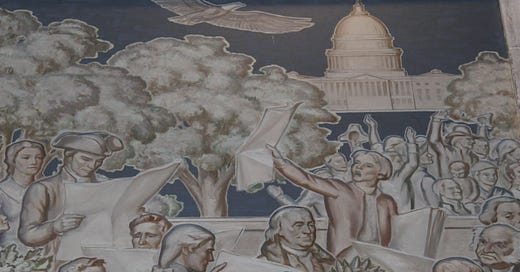The commercial news industry is incapable of fulfilling its constitutional duties
It's the business model's fault
(Part one of two.)
The nation’s biggest, most important news organizations failed in their biggest, most important task in 2024.
The whole reason the press is free in this constitutional democracy of ours, after all, is to create an informed electorate. And this one decidedly was not.
Polling data confirms the obvious: that many Trump supporters were deeply misinformed about most of the campaign’s defining issues, namely immigration, the economy, and the crime rate.
In the weeks since the election, there’s been a lot of public discussion about what the corporate/reality-based/mainstream media could have done differently.
Some of us believe that if elite journalists had been more forceful and direct about rebutting disinformation and reporting truths, that could have made a difference.
Some of us believe that if our newsrooms had been overtly pro-democracy, that might have made a difference.
At the same time, it is obvious that the mainstream media simply doesn’t make as much difference as it used to in a political ecosphere increasingly dominated by disinformation from right-wing and social media – especially with working-class and low-information voters.
This leaves us with two seminal questions:
Why wasn’t the media more aggressive about fighting disinformation and advancing democracy?; and
Why don’t working class voters pay as much attention to traditional media anymore?
It’s the Business Model
The answer to both questions is the same: It’s the business model.
I’ve spent the last four years excoriating reporters, editors and publishers for being cowardly to the point of dishonesty -- and I will continue to do so because people should be held to account for their behavior.
But in the greater scheme of things, it’s the system they work in that’s to blame.
The central problem is this: Our most important news organizations operate according to a business model that singularly values affluent customers. And that business model affects everything they do.
To be clear: The advertisers want to connect with the affluent, not the working class. The rich can afford subscriptions and get through paywalls. The marketing? It’s directed at people with disposable income.
Who do the journalists at our top news organizations have in mind when they write and produce? Affluent, well-educated readers and viewers. Not the average person on the street.
And so it should come as no surprise that the content is consciously and unconsciously shaped to suit the rich and well-educated – and the advertisers -- both stylistically and materially.
That means a tone that is effete, cautious, careful not to offend, and almost never outraged.
That means avoiding anything that could conceivably be seen as partisan, for fear of alienating the affluent or the advertisers.
That means a polished product. Nothing radical or too grabby. Nothing too antagonistic to corporate power. In short, nothing too populist.
Especially for organizations with paywalls, the goal is to attract and keep that affluent audience -- not to reach out to people who are not and never will be subscribers.
The end result is – tragically – a muted mainstream commercial media that has ceded the business of informing the masses to Fox and social media dominated by the right wing.
They are the ones who speak to the average, working-class Americans. Fox, for instance, has won over a mass audience not because of its conservative political views but arguably in spite of them. Fox is entertaining, it has a tabloid aesthetic, it embraces populist narratives, encourages antagonism and outrage, and finds charismatic personalities to deliver it all. It grabs viewers by the throat and riles them up.
A New Model is Needed
So why can’t mainstream commercial news organizations do what Fox does – but in the service of truth and democracy, rather than lies and fascism?
Because their short-term imperative is to serve their existing, affluent audiences, not save the world. They’re not really in the mass media business, they’re in the niche media business.
“Anything that’s not going to be profitable for them, it’s just not rational for them to do,” says Victor Pickard, who teaches media studies at the University of Pennsylvania.
“We need deep structural reform,” he says. For instance: “I think one thing we need to be looking at seriously is to encourage what’s left of the newspaper industry to transition into a non-profit or low-profit model, or a public benefit corporation.”
(Steven Waldman, who runs Report for America, has written extensively about such a transition, which he calls replanting.)
I’ve been a big supporter of nonprofit newsrooms serving local communities. And I’ve urged Jeff Bezos to donate the Washington Post to a nonprofit organization devoted to journalistic independence.
But I hadn’t really considered just how central the business model is to the political-coverage failures I regularly chronicle here.
I’m increasingly thinking that only a nonprofit newsroom can be the national newsroom the public needs and deserves.
TOMORROW: Part two: How a nonprofit news organization would cover national politics



